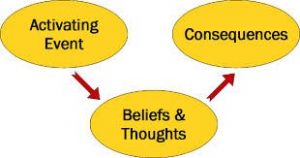The ABC of Rational Emotive Therapy
 Change is simply inevitable. Change is something that will happen no matter how hard we try to stop it. Change is a part of the world we live in. Day turns into night and night into new day. Sun rises and sets. Seasons change. A new born slowly starts maturing. With every passing moment, events change. And most of these events cannot be predicted. Sometimes, the changes that take place in our lives are slow, and sometimes even anticipated. While other times, the changes are immediate and sudden. Abrupt changes can throw us into a place of fear and uncertainty.
Change is simply inevitable. Change is something that will happen no matter how hard we try to stop it. Change is a part of the world we live in. Day turns into night and night into new day. Sun rises and sets. Seasons change. A new born slowly starts maturing. With every passing moment, events change. And most of these events cannot be predicted. Sometimes, the changes that take place in our lives are slow, and sometimes even anticipated. While other times, the changes are immediate and sudden. Abrupt changes can throw us into a place of fear and uncertainty.
Both abrupt and anticipated changes make us anxious. Moreover, changes whether anticipated or unanticipated don’t always produce an outcome that we favor; for instance, a couple might date for 10 years, get married and soon their relation becomes wobbly. The couple might have had anticipated good time in the 10 years dating, but things end in bad taste. In another example, a student hardly prepares for a competitive exam; he gives the exam for the heck of it but passes it! So, the point is we hardly have any control on events taking place in our life.
Rational Emotive Therapy (RET) was first developed by Albert Ellis (American Psychologist) in the 1950s. Although Ellis had initially done work in the field of Behaviorism, later became convinced of the causal nature of cognitive (conscious intellectual thinking) processes. He went on and developed a model of behavior that involves a continuous relationship between environmental factors and the internal mental state of human mind. According to Ellis, a person’s cognitive process determines according to his expectations from life, and the way he interacts with life. A happy person will interact happily with others, while a depressed person might interact with a weighed down attitude with others.
 For Ellis, the alphabets ABC offered insights into how to overcome self-defeated behaviors and cognition. The “A” here stands for activating events in life. It includes of all good, bad and the ugly events in life. The everyday obstacles and difficulties that everyone is forced to deal with just as a consequence of interacting with the world. The “B” stands for our belief system. It is our belief system which leads us to think positive in an adverse situation to overcome the hardship. The “C” represents the consequences that arise as a result of our belief. Negative beliefs underpin and contribute to negative outcomes, and that having positive beliefs about confronting adversity naturally lead to good results.
For Ellis, the alphabets ABC offered insights into how to overcome self-defeated behaviors and cognition. The “A” here stands for activating events in life. It includes of all good, bad and the ugly events in life. The everyday obstacles and difficulties that everyone is forced to deal with just as a consequence of interacting with the world. The “B” stands for our belief system. It is our belief system which leads us to think positive in an adverse situation to overcome the hardship. The “C” represents the consequences that arise as a result of our belief. Negative beliefs underpin and contribute to negative outcomes, and that having positive beliefs about confronting adversity naturally lead to good results.
 From the moment one comes into the world, begins to develop his/her belief system. A person’s belief system forms on all rational and irrational inputs which go into him. As a child one does not have a well formed capacity for logical inference therefore developing one’s belief system is not necessarily rational process. It is rather a process based upon one’s experience in the world. As a person matures, his abilities develop and his understandings expand. He starts gathering information and he gathers evidence for making decisions. His belief system also depends a lot on his traditional background. He makes or breaks dogmas depending on how authoritative he is. On the other hand, if a person is vulnerable and a follower of some bossy associates in life, his associations matter a lot. Cheerful and positive associations make us happy, negative associations make us sadder and nagger. Revelations are equally important in our life in constructing our belief system. Revelation has the power to unmask things and it can unfold many mysteries in life. Revelation is divinity. Wisdom helps us to live healthier life.
From the moment one comes into the world, begins to develop his/her belief system. A person’s belief system forms on all rational and irrational inputs which go into him. As a child one does not have a well formed capacity for logical inference therefore developing one’s belief system is not necessarily rational process. It is rather a process based upon one’s experience in the world. As a person matures, his abilities develop and his understandings expand. He starts gathering information and he gathers evidence for making decisions. His belief system also depends a lot on his traditional background. He makes or breaks dogmas depending on how authoritative he is. On the other hand, if a person is vulnerable and a follower of some bossy associates in life, his associations matter a lot. Cheerful and positive associations make us happy, negative associations make us sadder and nagger. Revelations are equally important in our life in constructing our belief system. Revelation has the power to unmask things and it can unfold many mysteries in life. Revelation is divinity. Wisdom helps us to live healthier life.
“C” is consequences. They are result or effect, typically one that is unwelcome or unpleasant. They also mean an act or instance of following an act. Consequence is a result or an outcome.
People have slaughtered each other in wars, people have gone length into investigations which sometimes are twisted and turned as per demand of time. Irrational politics in the world has created havoc leaving the rationality far behind. Bad political actions for centuries have been based on racism, religion and dogmas. See how powerful beliefs are. They are so overly powerful that they can make or break global systems. I want to quote here yesterday, on 7th Jan 2015 how some brilliant cartoonists in France were killed by some fundamentalists.
 Belief in religion makes people so blind that yesterday’s news of hooded gunmen killing cartoonists with pen names Charb, Wolinski, Cabu, Tignous and Honore who were famous for expressing their feelings towards all forms of authority with the world’s spiky, no-holds-barred political cartoons. Religion can make us so blind. These cartoonists’s irreverence has cost them their lives. They were most revered and controversial cartoonists in France. And why were these intelligent and fearless cartoonists shot? It’s because they drew caricatures of the Prophet Muhammad and other controversial sketches which raged feelings of Islamic community. See how our beliefs can mar our logic very easily.
Belief in religion makes people so blind that yesterday’s news of hooded gunmen killing cartoonists with pen names Charb, Wolinski, Cabu, Tignous and Honore who were famous for expressing their feelings towards all forms of authority with the world’s spiky, no-holds-barred political cartoons. Religion can make us so blind. These cartoonists’s irreverence has cost them their lives. They were most revered and controversial cartoonists in France. And why were these intelligent and fearless cartoonists shot? It’s because they drew caricatures of the Prophet Muhammad and other controversial sketches which raged feelings of Islamic community. See how our beliefs can mar our logic very easily.
Throughout history, humankind has paid reverence to beliefs and mystical thinking. Organized religion has played the most significant role in the support and propagation of beliefs and faith. This has resulted in an acceptance of beliefs in general; regardless of how one may reject religion, religious support of supernatural events gives credibility to other superstitions in general and the support of faith, belief without evidence, mysticism, and miracles. Most scientists, politicians, philosophers, and even atheists support the notion that some forms of belief provide a valuable means to establish “truth” as long as it contains the backing of data and facts. Belief has long become a socially acceptable form of thinking in science as well as religion.
It is therefore very important to change, to twist our old and trodden belief system and design a healthy and empowering system. However, it is interesting to note that rational thinking requires the adherence to beliefs.
Artificial beliefs and memories can affect people’s attitudes, at least in the short term. One gets to choose his beliefs. One also get to choose the actions that he chooses to take but sorry nobody gets to choose the consequences of his beliefs. According Rational Emotive Therapy, people contribute to their own psychological problems by the way they interpret events and situations. However, every human is empowered to change his belief system. Irrational beliefs in our life only trouble us and do not help us. One can learn skills to get over the disputing irrational thinking.
At any point in life, it is worth to spend some time and focus on self-interest, self-direction, and tolerance of self and others, flexibility, self-acceptance, and scientific thinking. It is always better to adopt this type of balanced thinking which helps in experiencing a minimum of emotional disturbance. Albert Ellis said that all psychological problems stem from the way people think about things. The core of much psychological trouble comes because of irrational ideas that are self-defeating.
So friends, the beliefs you have about yourself can drive your long-term behavior. Maybe you can trick yourself into taking some important decisions that requires your basic behavior. But, if you don’t shift your underlying identity, then it’s hard to stick with long-term changes. The root of behavior change and building better habits is your uniqueness. Each action you perform is driven by the fundamental belief that it is possible. So if you change your identity – the type of person that you believe that you are, then it’s easier to change your actions. You are the carver of your destiny.













































